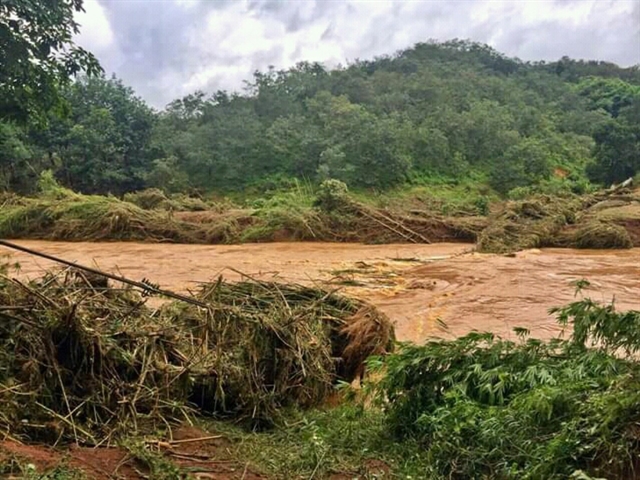 Politics & Law
Politics & Law


|
| A raging flood that washed away crops, houses and damaged infrastructure of the mountainous commune Phú Sơn, Bù Đăng District, in Bình Phước Province in August this year. — VNA/VNS Photo |
HÀ NỘI — The Government needs a “more comprehensive and broader approach” towards climate change issues, National Assembly deputies said on Friday morning, as the country’s parliament discussed the two closely-related laws on dykes and prevention of natural disasters.
Nguyễn Lâm Thành from the Lạng Sơn Province delegation suggested that in the current context, the name of the law should be extended to “Law on prevention of natural disasters and climate change adaption.”
“Climate change is an extended process that requires us to plan and carry out both short-term measures to deal with contingencies and strategic measures in the long run, so apparently, limiting the scope of the bill to just natural disasters is not sufficient,” Lâm Thành said.
He also asked that there should be responses prescribed in the law with regard to more forms of nature’s adverse phenomena, such as drought, severe cold or hoarfrost, instead of merely focusing too much on flooding triggered by heavy rain.
Regarding the proposal to set up an Anti-Natural Disaster Fund that will be managed by the Ministry of Agriculture and Rural Development and be used during devastating disasters and natural emergencies and other national and regional anti-natural disaster efforts, deputy Lâm Thành said that more consideration should go into this idea to prevent the overlapping of roles because calling for and receiving international support and donations has been assigned by the Government to the Việt Nam Red Cross, according to the existing Law on Budget.
The Lạng Sơn deputy also urged more clarification on the management and cooperation between the Việt Nam Red Cross and the agriculture ministry in the event that the proposed fund was approved by the parliament.
A deputy from Cần Thơ Province, Nguyễn Thanh Phương, is concerned about the necessity of an anti-natural disaster fund at a central level when there are already funds at local levels to serve these purposes, adding that the Government should prescribe a mechanism to transfer funds between the central-level fund and its local counterparts in case of necessities.
Phạm Văn Hoà, a deputy from Đồng Tháp Province, was in favour of the idea but asked that serious oversight should be exercised over revenues and expenditures of the fund in order to preclude corruption, losses and waste of the valuable budget.
Lê Quang Trí from the Mekong Delta Province of Tiền Giang’s delegation at the meeting concurred with the draft law’s amendment which stipulates prioritising budget for developing and implementing science and technology programmes in preventing and dealing with natural disasters.
Trí said that the investment into science and technology in this regard has not received due attention in recent years.
“Stretches of the coastline in the Mekong Delta are suffering from serious erosion, with many parts experiencing erosion rates of 20-30m a year. For example, a dyke was built 1 kilometre from the shoreline 30 years ago, fast forward to the current time, the sea already laps at the dyke’s foot and threatens to consume it soon. There really should be research done into this issue to protect our coastline more effectively,” Trí said.
Speaking at the meeting, agriculture minister Nguyễn Xuân Cường said the bill was meant to catch up with the increasingly devastating and unpredictable natural disasters, further complicated by climate change.
Cường said the authors would submit explanations to clarify unclear items and collect more feedback – especially on issues with differing opinions – to improve the draft bill.
Laws adopted
In the afternoon, the National Assembly voted to pass the Law on entry and exit of Vietnamese citizens with 91.51 per cent approval.
Taking effect in July next year, the law would allow passport applicants to submit their information online and receive the passport later, instead of having to show up physically at the immigration police offices.
Notably, citizens over 14 could opt to have their passports embedded with electronic chips that would allow them to make use of automated self-service ePassport gates that are becoming more commonplace in modern airports in developed nations.
The new law would also require separate passports for each individual, in contrast to the current regulations where a person younger than 9 years old will have to share a passport with their parents.
Also, in the afternoon, the National Assembly passed the law amending and supplementing some articles in the Law on Government Organisation and the Law on Local Administration Organisation on November 22 with 89.23 per cent approval.
The law will take effect from July 1, 2020.
The draft law amending and supplementing some articles of the Law on Government Organisation and the Law on Local Administration Organisation was tabled for discussion at a working session of the legislature on October 25.
Lawmakers expressed their approval for adjustments in the draft law and contributed opinions in order to improve the document.
Most supported regulations on reducing the number of vice chairpersons of the district-level People’s Council and increasing vice chairpersons of the People’s Committee in a second-tier commune. — VNS




